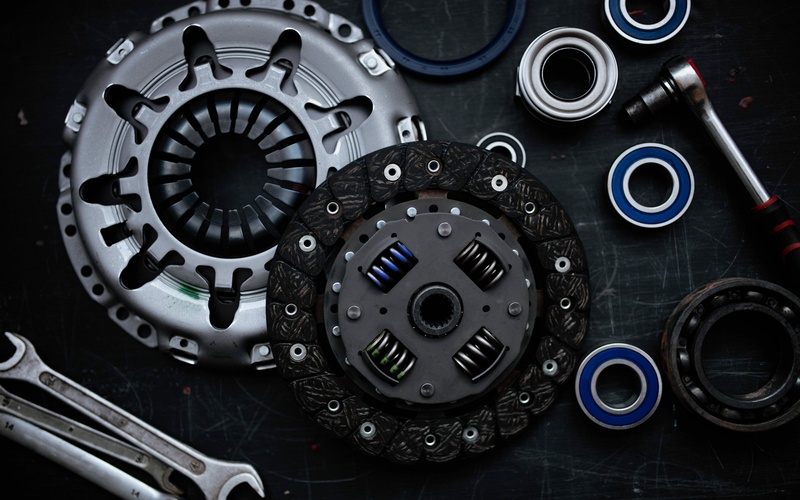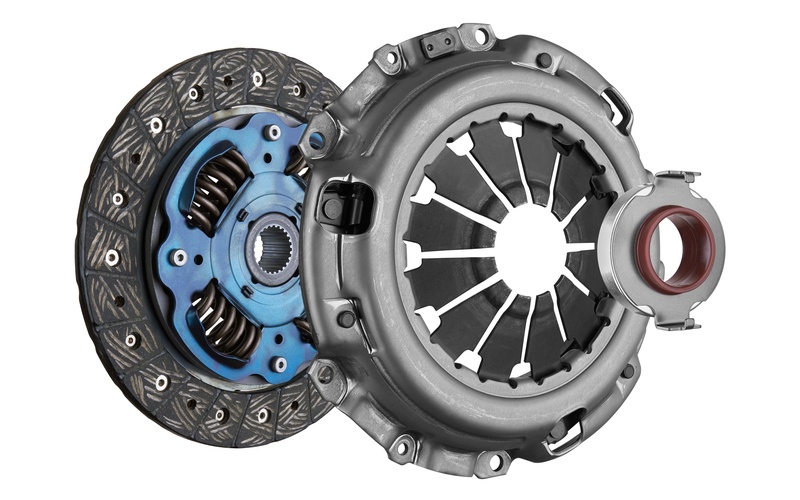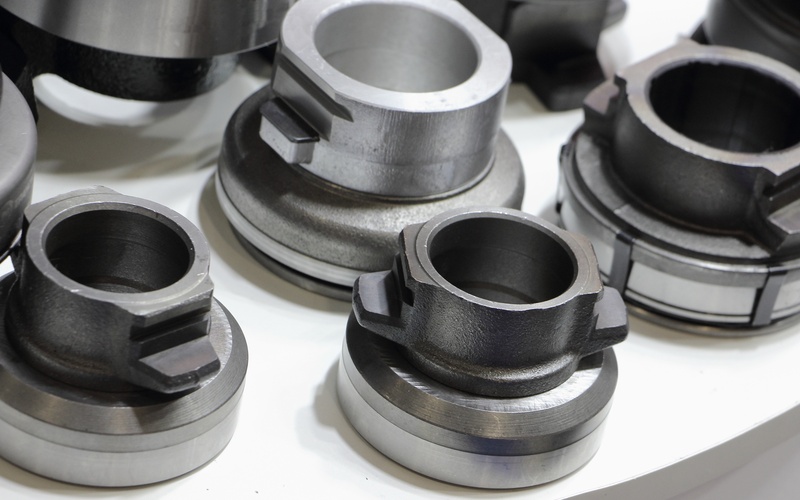Hydraulic vs. Mechanical Clutch Bearings: Which Is Better?

When it comes to clutch systems in vehicles, the clutch bearing is extremely important. It facilitates a smooth, efficient vehicle operation by establishing the connection and disconnection of the engine from the transmission.
If you’re browsing vehicles with different clutch systems or replacing the system, the primary choices are hydraulic and mechanical clutch bearings, but which is better? Continue reading as we tackle this question and compare the two clutch bearings.
What Are Mechanical Clutch Bearings?
Mechanical clutch bearings or cable-actuated systems used to be standard in manual transmission vehicles. They operate through a cable system that connects the clutch pedal directly to the clutch assembly. When the driver depresses the clutch pedal, the cable pulls on the clutch fork, which, in turn, engages the throw-out bearing and releases the clutch.
Advantages of Mechanical Clutch Bearings
Vehicle owners value mechanical clutch bearings primarily for their simplicity. Their simple design results in fewer components and potential issues. Many drivers also appreciate the tactile feedback that mechanical systems provide; the firm pedal feel and direct mechanical connection help drivers sense clutch engagement precisely.
The mechanical systems in old vehicles are easy to maintain and repair. Replacement parts tend to be affordable and widely available, making them a practical choice for vintage car enthusiasts or individuals conducting repairs on a budget.
Drawbacks of Mechanical Clutch Bearings
While simple, mechanical systems require more effort to operate, leading to a stiff pedal. Over time, the cable can stretch and demand periodic adjustments. The system’s lack of self-adjusting capabilities also means that wear and tear can compromise performance, leading to less consistent clutch engagement.
Mechanical clutch bearings are also prone to failure in high-performance or heavy-duty scenarios. The physical strain on the cable can cause it to snap suddenly, leaving drivers stranded and in need of immediate repair.
Common Applications of Mechanical Systems
Mechanical clutch bearings are most common in older vehicles or motorcycles. Classic cars from the 1970s and 1980s, and even some models from the 1990s, frequently feature this setup.

What Are Hydraulic Clutch Bearings?
On the other hand, hydraulic systems utilize hydraulic fluid to engage and disengage the clutch. These systems rely on a more complex interaction between the clutch master cylinder, a slave cylinder, and hydraulic lines.
When pressing the clutch pedal, the master cylinder generates hydraulic pressure, which travels through the lines to the slave cylinder or hydraulic release bearing. This mechanism ensures a smooth, precise operation.
Advantages of Hydraulic Clutch Bearings
Hydraulic clutch bearings offer a smooth and consistent pedal feel, requiring less physical effort—perfect for long drives or city traffic. The self-adjusting capabilities ensure consistent performance as the clutch wears while reducing drivetrain shock during engagement, which minimizes stress on other components. This makes them ideal for high-performance applications like racing or drifting that necessitates fast shifts.
With fewer moving parts and the elimination of components like the clutch fork, hydraulic clutches feature a straightforward design. Their increased durability results in reduced friction and wear points.
Drawbacks of Hydraulic Clutch Bearings
The primary downside of hydraulic systems is their reliance on fluid dynamics. Hydraulic leaks can occur due to faulty seals or damaged lines, compromising the system’s performance.
Furthermore, bleeding the system to remove air bubbles is a maintenance task unique to hydraulic setups, though this process is relatively straightforward. Hydraulic systems can also feel less connected to the road for some drivers. While smooth and forgiving, they lack the deep-seated feedback that enthusiasts associate with traditional mechanical setups.
Common Applications of Hydraulic Systems
Hydraulic clutches have become the modern standard in most vehicles produced from the 1990s onward. They’re especially prevalent in high-performance and luxury cars, where efficient operation and reduced pedal effort are paramount.
Why Hydraulic Clutch Bearings Stand Out
Hydraulic clutch bearings offer several advantages that make them the preferred choice in contemporary vehicles. Primarily among these benefits are their seamless operation, self-adjusting capability, and prolonged lifespan.
Smoother Operation
Hydraulic systems offer a soft and consistent pedal feel, making driving more comfortable and reducing fatigue for the driver. The fluid operation enhances the overall driving experience, especially in stop-and-go driving conditions.
Self-Adjusting Mechanism
One of the standout advantages of hydraulic clutches is their self-adjusting capability. Unlike mechanical systems that require regular adjustments, hydraulic clutches automatically maintain consistent performance over time, saving both time and effort for the driver.
Reduced Component Stress
Hydraulic systems evenly distribute pressure across the drivetrain, which reduces stress on individual components. This results in less wear and tear, prolonging the lifespan of the system and improving its reliability.
Fewer Moving Parts
By incorporating hydraulic bearings, these systems eliminate the need for additional components like clutch forks. This simplification streamlines the system and reduces the number of potential failure points, improving overall durability.
Performance-Driven Design
Hydraulic clutches can handle demanding conditions, whether it’s the rigors of daily driving or the high-performance demands of the racetrack. Their design ensures reliable and efficient operation no matter the challenge.
Hydraulic vs. Mechanical Clutch Bearings Comparison
Now that we understand the makeup, pros, and cons of hydraulic and mechanical clutch bearings, which one is better? While each has its advantages, hydraulic clutch bearings are frequently the best choice for drivers looking for greater responsiveness, durability, and reliability. Here’s a deeper look into these systems.

Feel and Responsiveness
Hydraulic clutches excel in providing a smooth, effortless operation, which is especially beneficial in stop-and-go traffic or long drives. While mechanical clutches offer a more direct, tactile feel, hydraulic systems are more comfortable and precise comfort, allowing easier gear shifts and reducing driver fatigue. For those seeking convenience and a modern driving experience, hydraulic systems are the superior choice.
Maintenance
Hydraulic clutches require less frequent upkeep than mechanical systems, which regularly require cable adjustments and lubrication. Although occasional bleeding or leak repairs may be necessary, these tasks are less common and simpler with proper maintenance. The self-adjusting nature of hydraulic systems means you spend less time worrying about wear and tear, making them a reliable long-term solution.
Cost
While hydraulic systems may have higher upfront costs, they’re more cost-effective in the long run due to their durability and fewer maintenance needs. Mechanical systems, though initially cheaper, can lead to recurring expenses for adjustments and repairs, particularly in older vehicles. For a modern, hassle-free driving experience, hydraulic clutches are worth the investment.
Durability and Reliability
Hydraulic systems provide long-term durability because fewer parts are likely to wear in comparison to mechanical systems, where cables can stretch or snap over time. Properly maintained hydraulic systems provide consistent performance and reliability. Their sealed design also makes them less susceptible to external elements, offering a dependable solution for today’s vehicles.
Find Premium Clutch Parts at Clutch Masters
Hydraulic clutch systems outshine mechanical ones in functionality, comfort, and performance, making them a top choice for car enthusiasts. If you’re looking for high-quality hydraulic clutch parts, look no further than Clutch Masters Industries.
Our extensive inventory of clutch kits includes everything a hydraulic system needs, including bearings, lines, master cylinders, and more. Browse our selection online or contact our staff to speak with an expert today.


